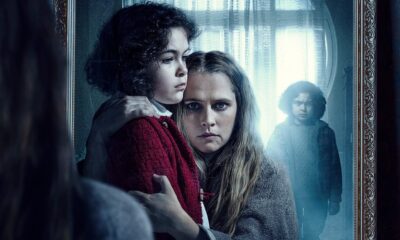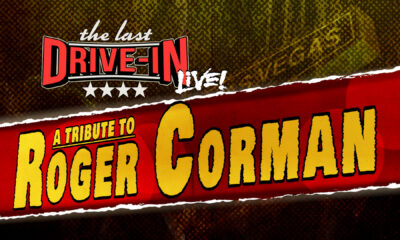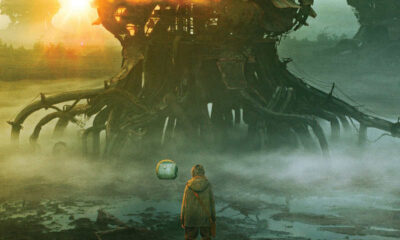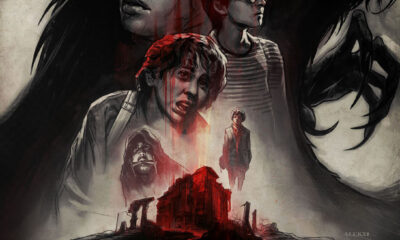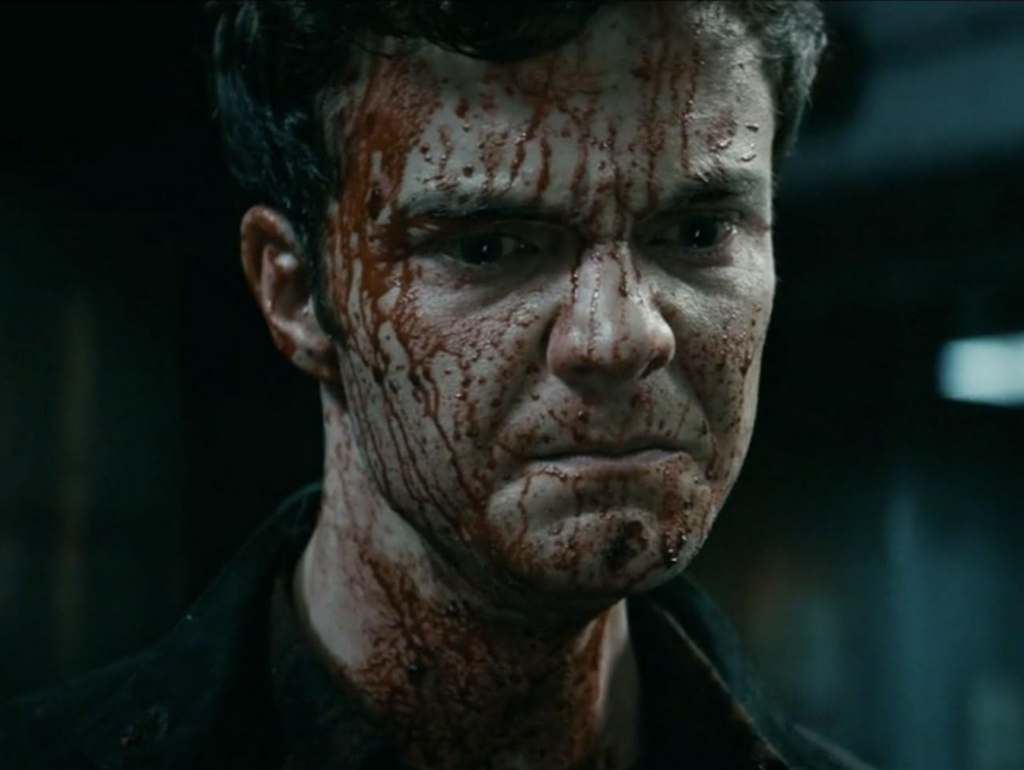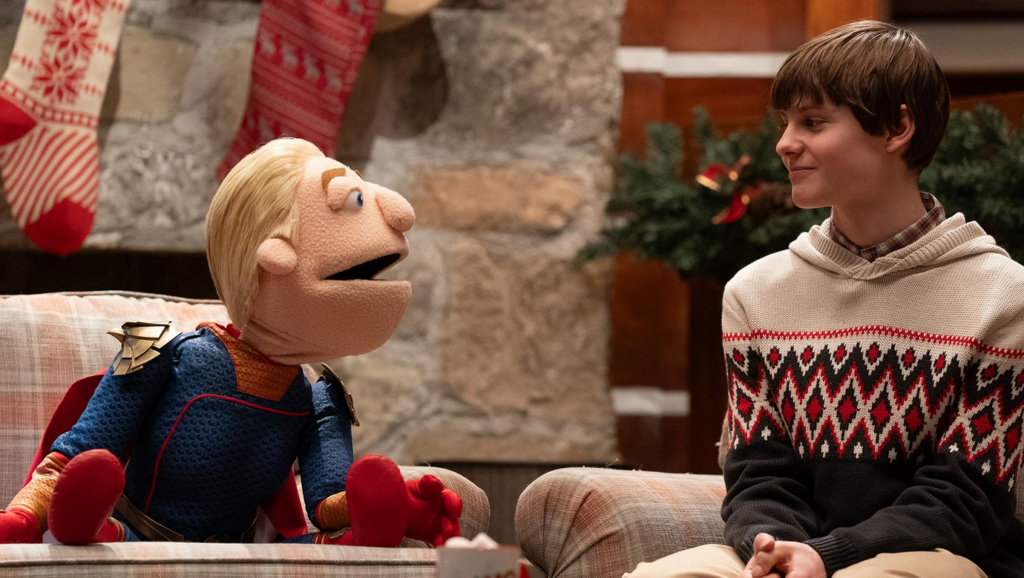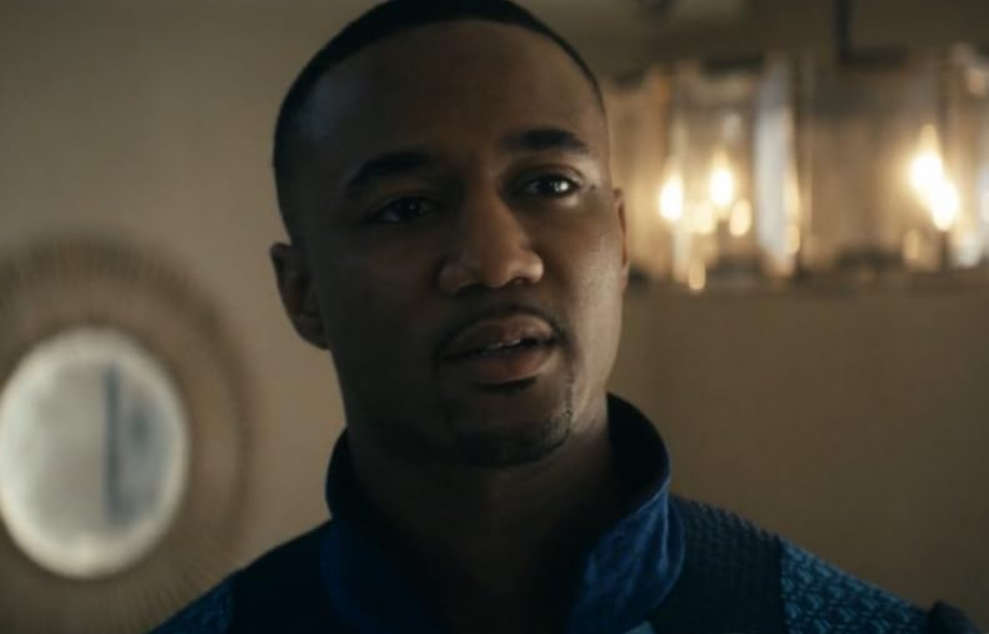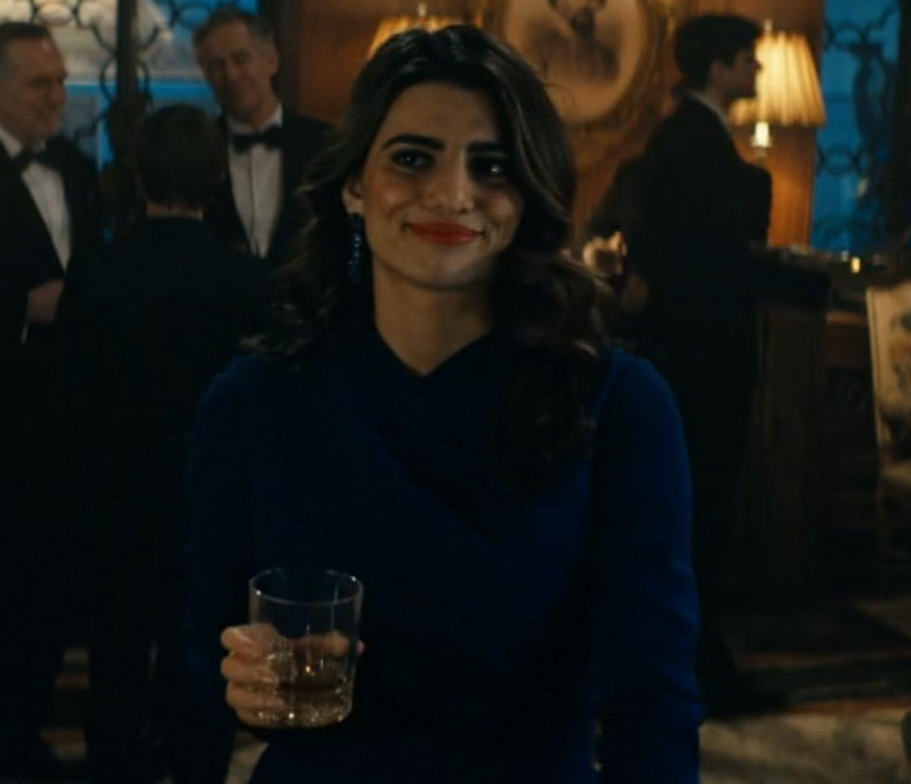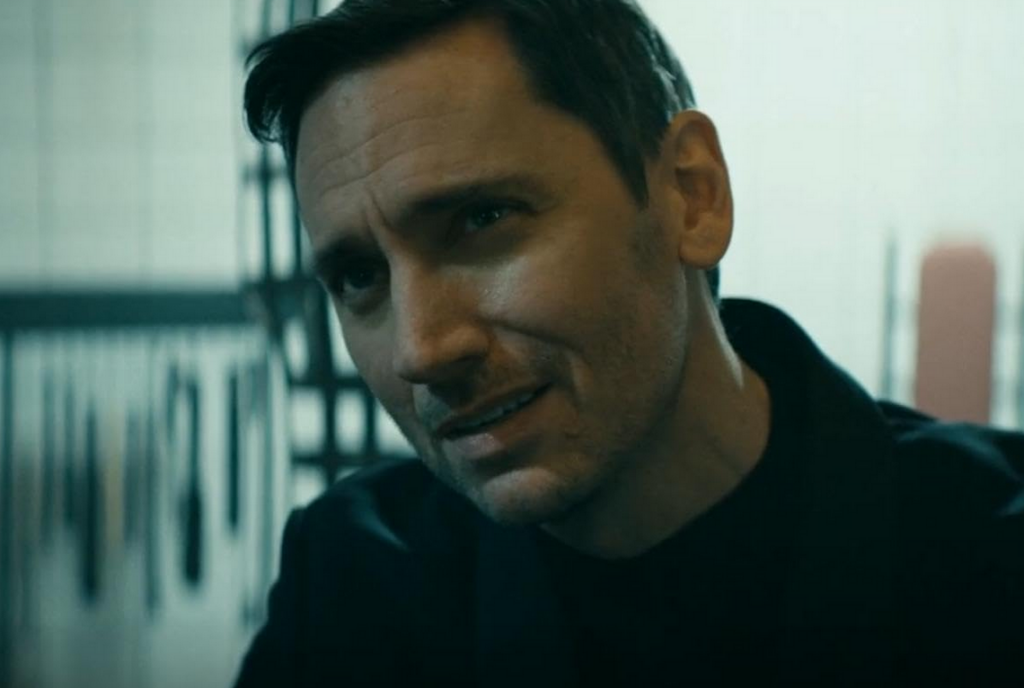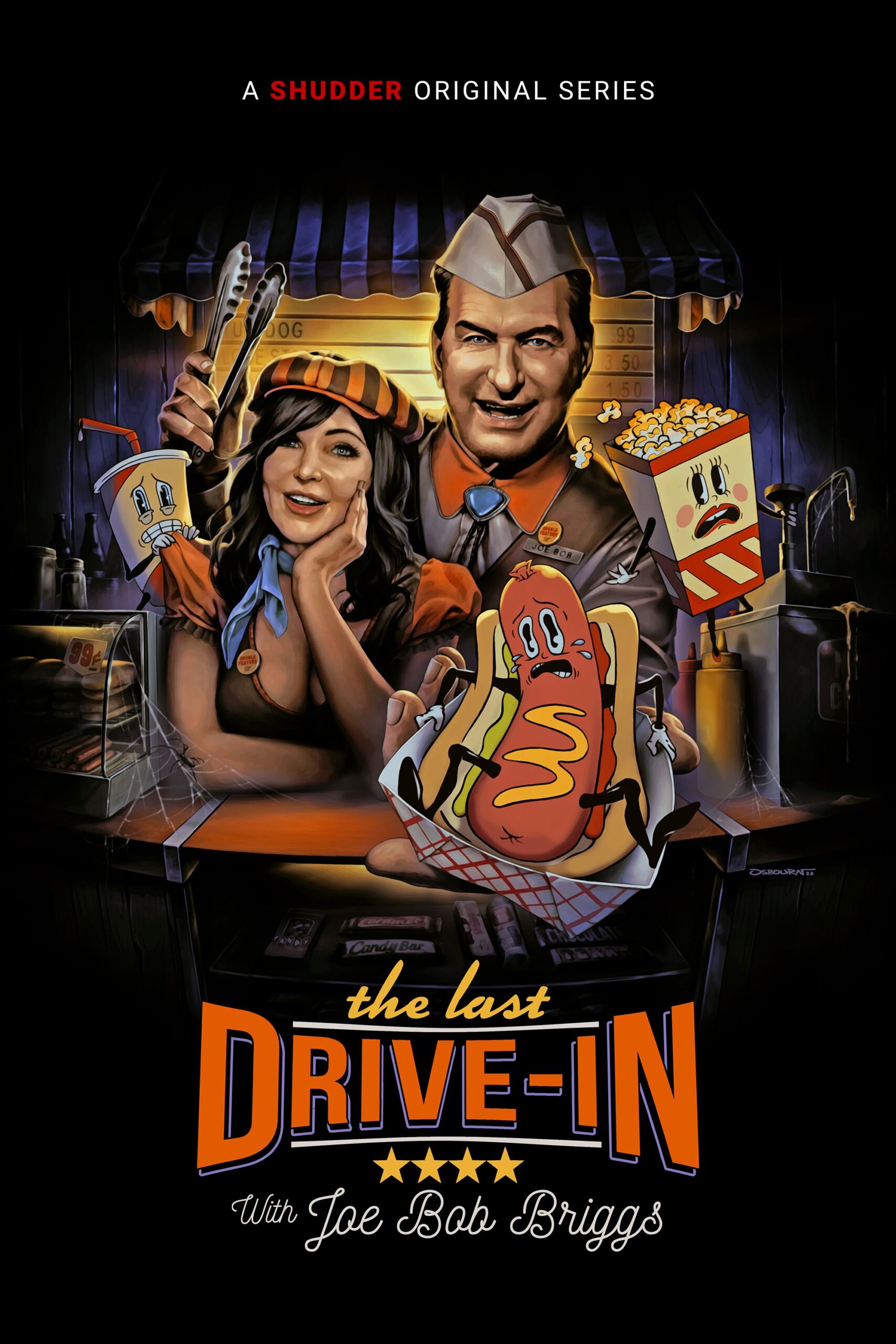
The Last Drive-In with Joe Bob Briggs: Perfectly Mad Animation Night
More Videos
Published
1 year agoon
The Last Drive-In with Joe Bob Briggs marches toward the season finale with its indiscriminate movie selections alongside the informative, and sometimes on-topic, rants Joe Bob delivers during breaks in the films. His co-host, the intelligent and beautiful Darcy the Mailgirl, does her best to keep him under control but he is one hard to wrangle cowboy. It can be watched on AMC+ and Shudder.
CW // Perfect Blue includes graphic animated depictions of SV and SA
Animation Night
Mad God (2021) and Perfect Blue (1997) have three things in common: 1) they are animated 2) they are horror 3) you’re going to need a shower after watching them. Well four things, if you count being shown together on The Last Drive-In during the first-ever Animation Night.
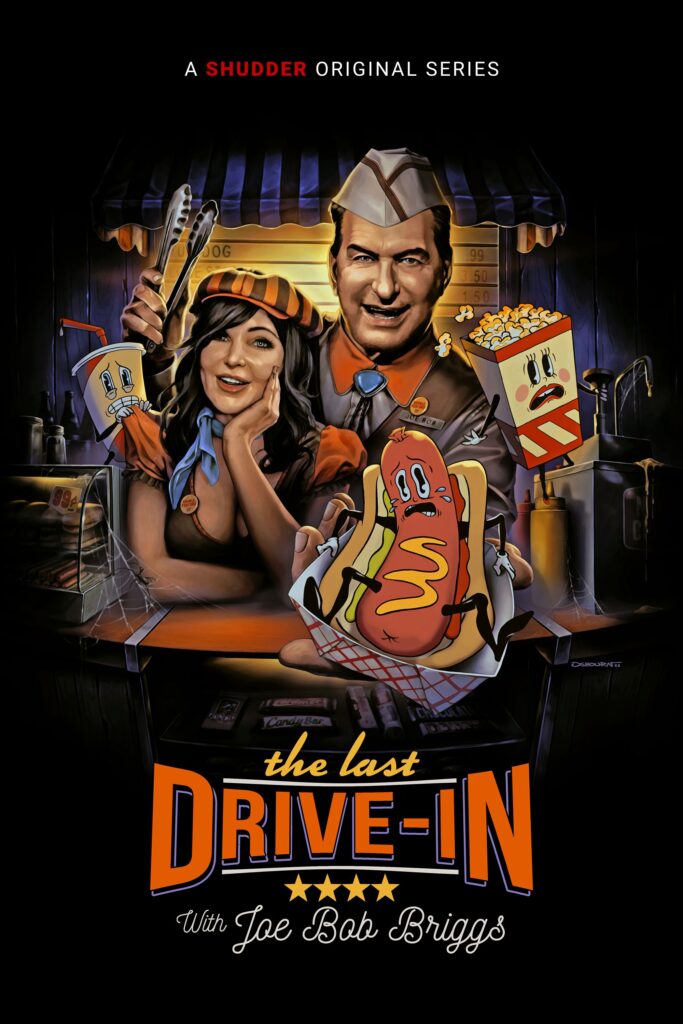
It’s a Mad, Mad World
Instead of opening the episode with a questionably on topic rant, Joe Bob breaks with convention and gets right to business. He introduces the Phil Tippett created stop motion, mostly speechless film Mad God almost immediately and warns the audience it is nearly indescribable.
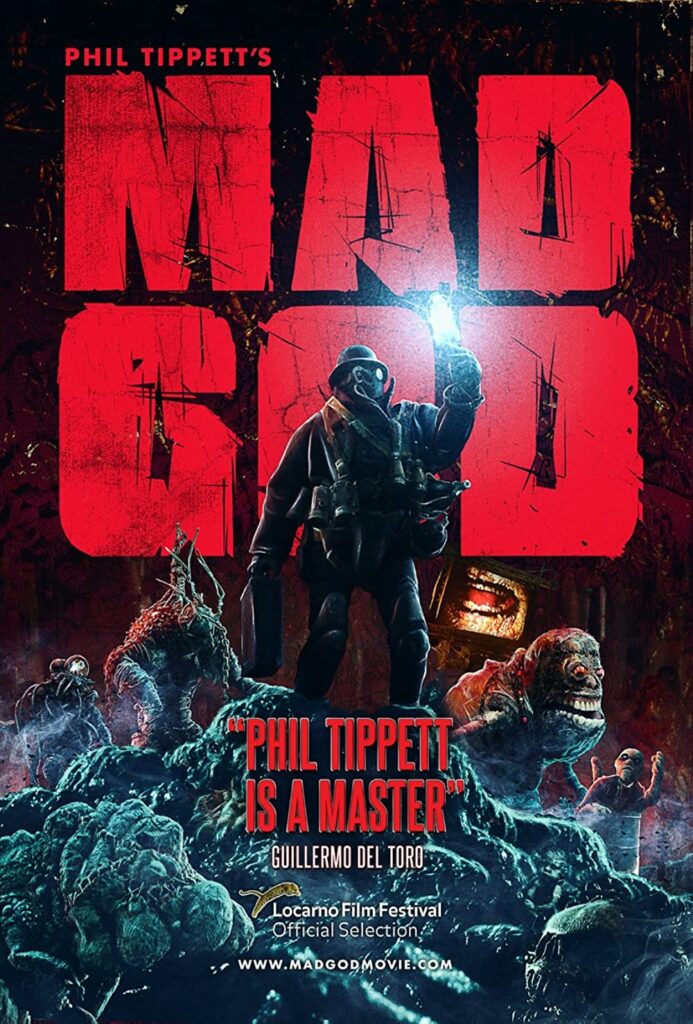
To prove its elusive nature, Joe Bob reads out multitudes of reviews full of nouns and not verbs. When one review mentions dieselpunk, he appears confused by the concept of ___-punk. Despite Darcy’s best efforts at explanation, he sums it up as “Fuck you dieselpunk.” I personally enjoy several dieselpunk movies, most notably Nausicaä of the Valley of the Wind (1984).
Concessions Break
When asked what sort of “popcorn” would be best to enjoy with Mad God, Darcy recommends psilocybin. Joe Bob has his own whiskey recommendation. He even recommends a specific high CBD, low THC strain of marijuana to enhance the experience. We really need these pieces of advice in advance, Joe Bob.
The most unhinged Drive-In Totals I have ever seen for Mad God include but certainly are not limited to: 1 giant cervix, legless mummy-head crawling creature, skinny hypnotized undead machine-people, monster-baby totalitarianism, plump nekkid stag-reel porn, and Nosferatu fu.
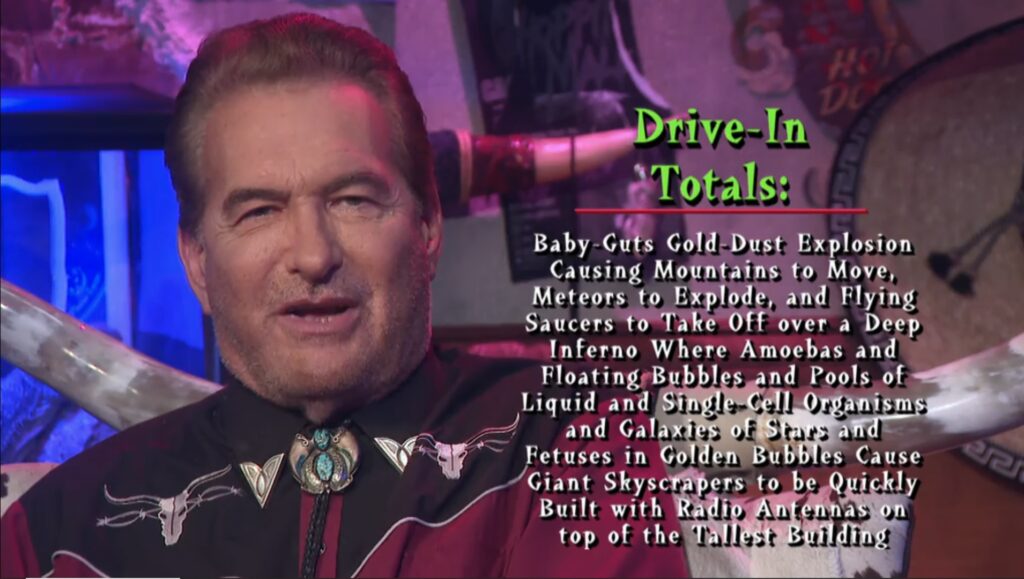
When Joe Bob finishes rattling off the totals, Darcy asks everyone on set to clap for the feat. The movie earns Joe Bob’s highest rating of four stars and Darcy’s stamp of “Weirdest Drive-In totals ever.”
Tippett or Not Tippett.
As the movie slogs its way through hell, Joe Bob interviews the Oscar-winning creator of Mad God. Tippett is best known for his work on blockbuster films like Jurassic Park (1992). As well as the cult classic Starship Troopers (1997). Joe Bob makes it clear the main point of the interview is to get Tippett to accurately describe the plot of Mad God, but I don’t think he can count it a success by that metric.
In terms of being a sort-of basement masterclass in life philosophy and film, the interview is a wild success. Tippett does not hesitate to push on any and all assumptions Joe Bob has about the creative process of creating Mad God or his interpreted meanings. Joe Bob is met with “No,” as an answer to more questions than I can count.
God is a Woman?
In one instance, Joe Bob repeatedly assigns the male gender to both God and The Assassin in his descriptions. Tippett quickly points out the assumed maleness is just that – assumed. “It’s a force, it’s a thing.” They are never given a gender. I find this level of discourse on The Drive-In to be absolutely delicious, and I watch in real-time as Joe Bob corrects his language away from he/him pronouns.
When talking about making the film, Tippett emphasizes repeatedly he did not know what story was being told until years after he started making it. When Joe Bob describes the movie as grim, Tippett endearingly responds, “I thought it was funny.” Having a dark sense of humor is, in my opinion, needed to get through the shit-shoveling world of today.
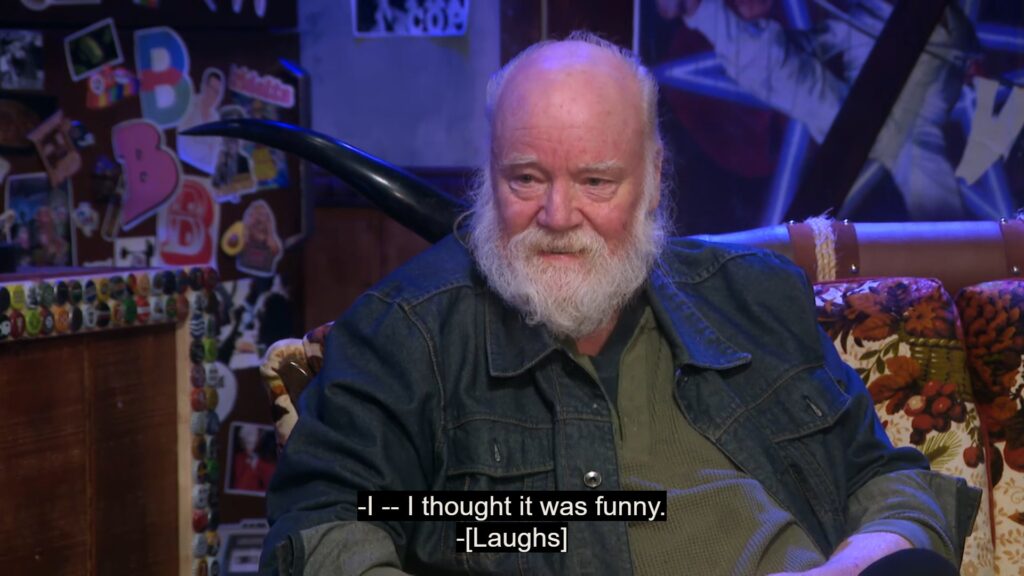
Estimated Time to Process: 30 years
Tippett says the film is about process as much as it is anything and resists most interpretations Joe Bob foists his way. “If I do know, I’m not saying,” remains the most cryptic answer given, hinting at an inner interpretation Tippett is unwilling to give.
One thing Tippett is clear about is the value of hard work and dedication. When Joe Bob asks him what advice he’d give a newcomer to the effects / animation field, his response is simple – practice. Sometimes the only prescription is more work.
Tippett mentions his failures as much as his successes and his struggles with mental illness & substance use. He talks about himself as if he does not know he is one of the greatest living visual effects artists. He is probably the definition of the word humble.
Even Joe Bob acknowledges this by revealing the college students who worked weekends on the film were the best students from the Academy of Art University in San Francisco. Tippett mentions them in the interview as if they were just random students who decided to help.
You may all go to Hell, and I will go to Texas
The interview again highlights Joe Bob’s best strength: his adaptability. With Darcy absent during the interview, Joe Bob was placed in her usual position of attempting to keep the conversation on track. Thankfully, he mostly lets Tippett wander with his thoughts. I certainly do not understand Mad God any better, but I definitely have a shifted perspective on life.
The fan mail segment delivers an emotional e-mail from Josh Hitchens. Hitchens describes how Monstervision gave him something to look forward to, and thereby a reason to live, as a young queer person in a hostile environment. We’re all glad you’re still here circling the sun with us Josh.
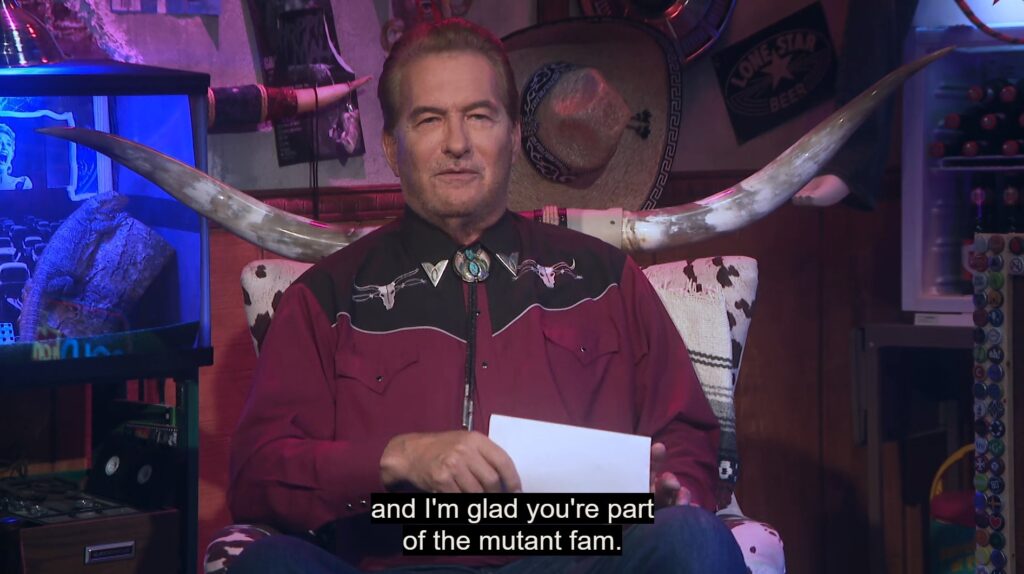
Joe Bob seems reluctant to accept this position as a source of comfort. Darcy succinctly describes the feeling as: “It’s like we felt like outsiders and we became insiders when we watched your show.” I re-discovered Joe Bob during the early chaos of the pandemic, and The Drive-In became my happy place. Now that I’m a part of the #MutantFam, I’m never leaving.
My rating for Mad God:

Lost in the Sauce
Joe Bob describes Satoshi Kon’s Perfect Blue as a “Japanese giallo.” The film tells the story of ex-idol Mima as she attempts an acting career and loses her grip on reality as her life becomes indistinguishable from her work & the lies of an online stalker. While more easily described than Mad God, Perfect Blue is itself a puzzle box with many layers of possible interpretation.
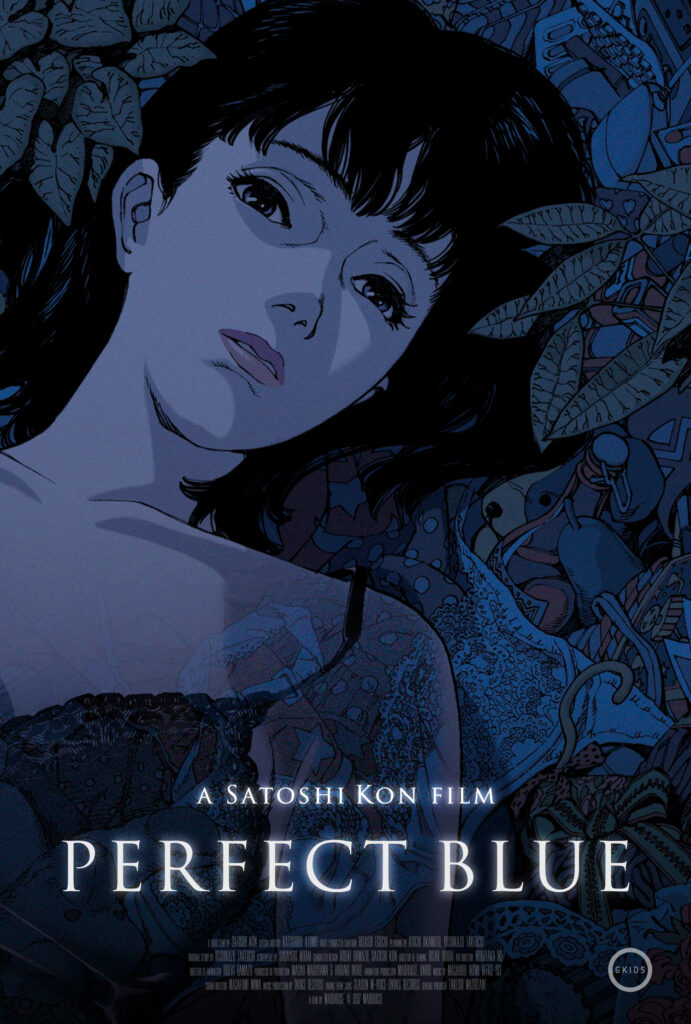
The Drive-In Totals include but are not limited to: 19 breasts, 1 downtown Tokyo apparition traffic-jam chase, gratuitous superhero movie, and aquarium fu. This movie also lands a four-star rating from Joe Bob.
I suddenly feel an urge to go back and see how every movie shown on The Drive-In is rated to see if my suspicion that Joe Bob is showing more movies he loves this season than in previous seasons is correct.
Sounds Like Mima
Darcy certainly loves Perfect Blue, and reveals her overall love for the anime genre. She gives a shout-out to Fullmetal Alchemist for being one of her favorites, and somehow manages to make the story sound almost delightful. If you’ve ever seen Fullmetal Alchemist: Brotherhood, you know how horrific the story gets.
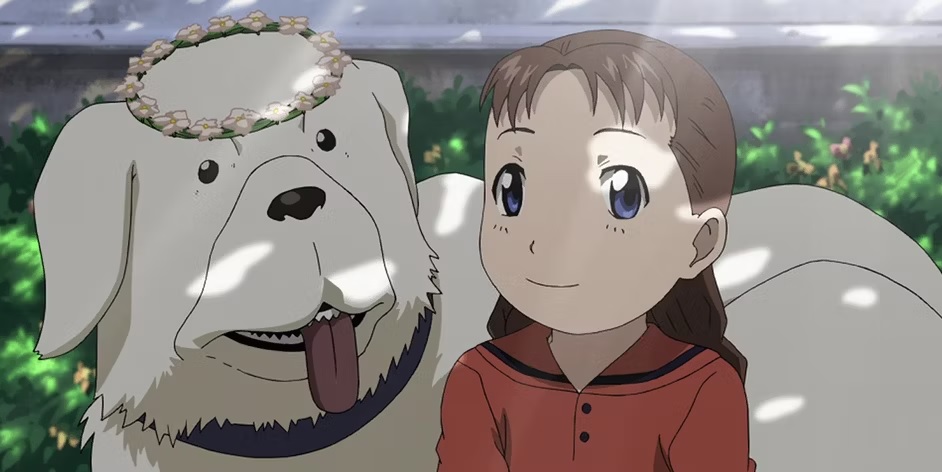
While Mima learns if she can trust herself to differentiate fantasy from reality, Joe Bob tells the audience Satoshi himself cannot be trusted. He describes Satoshi as a “sometimes misleading teacher.” This immediately reminds me of Tippett’s earlier interview and his seeming nonanswers to some questions.
What’s in a Name?
Perfect Blue is loosely based on the novel Perfect Blue: Kanzen Hentai. The name of the novel has a double translation of either Complete Metamorphosis or Total Pervert. Satoshi famously said there is no meaning behind Perfect Blue as a title, although Joe Bob does not believe that to be the truth. He calls Satoshi an unreliable narrator, which is not something you hear often in regards to a creator discussing their own work.
(Listen, there’s no better way to say this. I just need to say it and get it out of my system: I don’t think Joe Bob knows about hentai. He seems to not know a lot about anime in general, but the way he says Perfect Blue: Kanzen Hentai without even a glimmer of a smirk reveals his utter ignorance of anime’s kinky cousin. Some would say ignorance is bliss. I say we all deserve an education.)
While Satoshi cannot be trusted as a narrator, he can be trusted as a filmmaker. Joe Bob highlights in particular the use of match cutting and intercutting as a way to obfuscate the truth of what is happening to Mima. Though in true giallo fashion, he lays out enough clues that a viewer might be able to figure it out before the end.
Huge in Japan
Joe Bob brings out The Drive-In’s art director and the Tokyo Cowboy, Yuki Nakamura to act as the resident Japan expert during the film. We learn: Japanese people love idols. There are not too many idols. Some idols make good money. Joe Bob is pronouncing none of the Japanese names correctly.
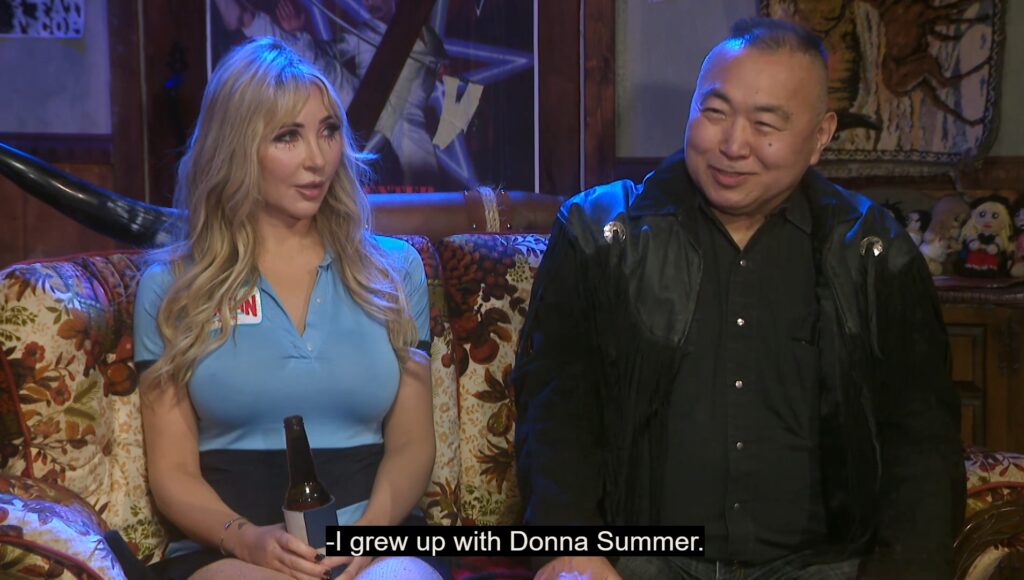
My rating for Perfect Blue:

Idol Worship
As the movie ends, we return for the final fan mail segment and Darcy finally reveals her perfect Mima cosplay. The fan mail comes in the form of a letter and an incredible maquette of the (mostly implied) monster from Hogzilla (2014) from Tim Martin. Martin’s letter follows a similar theme to Hitchen’s e-mail and describes The Drive-In as “virtually hanging out together on the front porch… welcome and invited.”
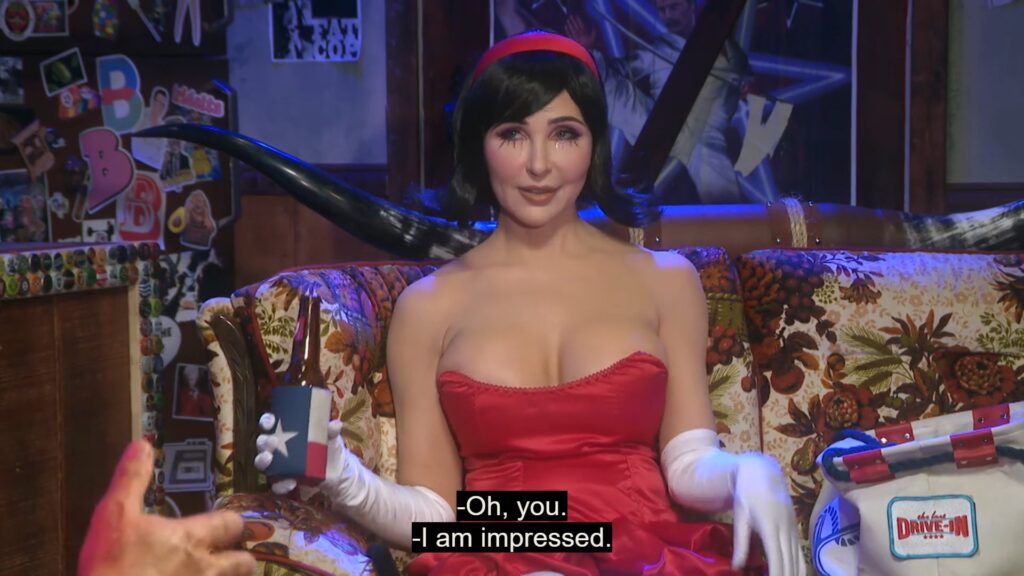
Fuck Cancer
Satoshi and Tippett seem to share the commonality of allowing the audience to keep whatever meaning they find in Perfect Blue and Mad God. Tippet thinks hell is the clock in the doctor’s office while you’re waiting for the cancer diagnosis. Satoshi wrote a beautiful letter to his friends asking them to guide his wife onwards after his own terminal diagnosis.
We do not seek. We find. I’m so glad, like countless others, that I found the #MutantFam.
My rating for the episode:

Kait (she/her) haunts the cornfields of the Midwest after being raised in a small Indiana town built on sickness and death. She consumes all sorts of horror-related content and spits their remains back onto your screen. You can follow her on Twitter at @ KaitHorrorBreak, where she live tweets The Last Drive-In with Joe Bob Briggs and posts other spooky things.

You may like
We have come now to the finale of season four of The Boys. And while it didn’t have the literal blood fireworks I wanted, someone did get ripped in half in the air. So, that’s pretty close.
As a note, I will try to avoid spoilers as much as possible. This ending was a hell of a gut punch that should be experienced as blindly as possible. That being said, I will not be able to avoid spoilers and still give a full legitimate review. Proceed at your own risk.
The story
The main storyline for this episode is the attempted assassination of President-Elect Robert Singer. The Boys join forces with the Secret Service to protect him. But, as we learned last episode, Annie has been replaced with a shapeshifter. A shapeshifter that was welcome not just into Hughie’s anus, but into the protective bunker in which the President-Elect is hiding.
What worked
The first thing I want to discuss about this episode is the ending. But we need to do this carefully.
The important thing here is that the ending breaks your heart on so many levels. So many terrible things are happening to characters that it’s almost hard to keep track. And each moment is significant to each character.
I cannot give a specific example. But no matter who your favorite character is, you’re going to weep for them.
Unless your favorite character is Sage. And this is the next thing that made this episode so fantastic.
I don’t think I’m spoiling anything to say that Sage’s plans worked out exactly as she wanted them to. And she got exactly what she wanted.
What she wanted wasn’t power. It wasn’t money or fame or vengeance. It wasn’t to win the love of anyone. She just wanted to see if she could do it.
That is a terrific, terrifying motivation! Because all she wants is to play a massive game of chess with people as pieces. She doesn’t care about anyone. She just wants to see how many people she can manipulate. She just wants to set things on fire to see if she can.
Fantastic. A plus villain work.
The next thing I want to discuss is a cornerstone of the whole series.
The morality of The Boys shifts through the series. While it’s very much a battle to save the world from overpowered super monsters, it’s also a battle for the souls of our real heroes. And in that battle, there are two warring factors. We have Hughie, always trying to bring everyone up to a better level. And we have Butcher, who has no problem at all hitting rock bottom with a shovel in hand to do some more digging.
In this episode, we saw almost every member of The Boys challenged. Will they rise to their higher angels, or sink with their demons?
On a similar note, I am so glad that the writers kind of addressed my issues with Annie. They did this by having the shapeshifter get right into her face and accuse her of thinking that she’s better than everyone.
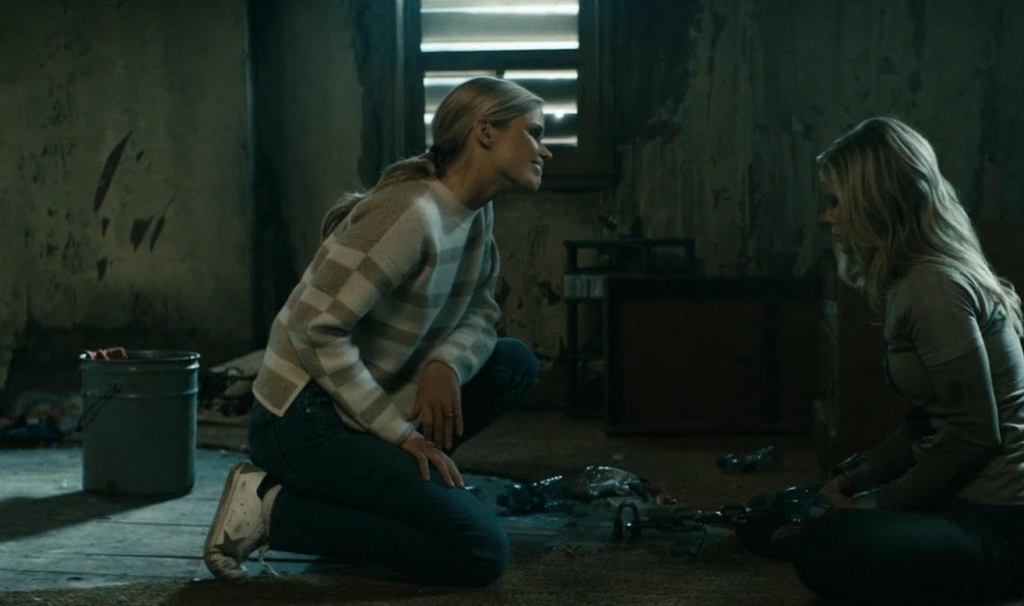
While that was devastating for the character, it was a little cathartic for those of us who felt like Annie was a little too good of a good guy.
What didn’t work
This is a small matter, but it is an issue that I want to address. After Annie finds out that Hughie slept with her doppelganger, she is furious at him.
In addition to this being unfair, it’s also a very cliche element to add. In almost every instance of a lookalike in fiction, there’s a moment where the love interest of the victim is fooled. Or almost fooled. And it’s always the same fight. It’s just played out and predictable. I’m just glad that it didn’t last very long.
Now that we’ve come to the end of the season, I can officially say that it was amazing. The story was deep and rich. The special effects were a stomach-turning good time. The character development was spot-on and satisfying. And, of course, it left me just about gagging to see what happens next. Unfortunately, it looks like we’ll have a bit of a wait. Because as of right now, the fifth season isn’t expected until 2026.

We’ve reached the second to last episode of The Boys, season four. And, as is appropriate for the penultimate episode of any show, things have to get a lot worse before they can get better.
Let’s discuss.
The story
Christmas is coming, and the whole world is getting ready. Ryan, despite being very clear that he didn’t want to appear on any TV shows or movies, has been strong-armed into participating in a Vought puppet Christmas special. He draws the line, though, when asked to sing about turning one’s parents in if they start talking about woke things.
Meanwhile, The Boys are trying to keep each other together. Butcher decides to take Sameer to the rest of the team. He also gets Frenchie out of prison, hoping they can make the Sup virus necessary to finally take down Homelander. Instead, this decision means disaster for one member of the team.
What worked
I first want to talk about Ryan’s speech near the end of the episode. Because it was exactly the moral of this whole story.
Ryan’s dad is a monster. His stepdad is also kind of a monster. But Ryan is a good kid. He cares about people, about family. And while he loves Homelander and Butcher, he doesn’t want to be like them.
Even better, this speech sounded like something a kid would say. Ryan didn’t open his mouth and start sounding like a college student all of a sudden. He sounds like a kid who misses his mom and wants to live up to the good standards she set for him. And I think that’s terrific.
Speaking of Homelander, he shot himself in the foot in this episode. I said earlier in the season that his hubris was going to be his downfall, and I was right. Without Sage, he just has the same weaknesses he’s always had. He’s going to fail because he just isn’t clever enough or patient enough to succeed.
Without Sage, I think a win is in the bag for The Boys. This isn’t to say that Homelander by himself isn’t dangerous. It’s just that he’s more like a wildfire than a controlled burn. He’s going to cause a lot of damage, but not get anything he wants out of it.
More’s the pity for him and everyone else who has to share his world.
Finally, I am thrilled with A-Train’s redemption story. I love that he wants to be a good person not to save himself, but to be a good person. His honest, pure and warm reaction to that little kid smiling at him in the last episode was heartwarming. It changed him in a moment, bringing to light a goodness that he’s been keeping under wraps for a long time.
This, along with Ryan’s courageous speech, proves once again what The Boys does so well. Yes, it’s gruesome. Yes, there’s blood and balls and batshit events. Yes, someone occasionally gets ripped in half. But there is a true human goodness in the story. One that we catch glimpses of. There are good people among the monsters. There is hope for redemption.
What didn’t work
Of course, so few things in this life are perfect, and this episode was no exception. For instance, I was irritated by the insinuation that Butcher cheated on his wife.
That just doesn’t make any sense. We’ve seen flashbacks of Billy and Becca. They were happy. He was happy. He was head over heels for her. And I don’t think it’s realistic or necessary for the character to throw in that he cheated. It does nothing to add to the story, it’s just a weird and offputting moment.
Doesn’t Butcher have enough to hate about himself? Can’t we just give him that at least he was a good husband?
Finally, I kind of hate that we ended up with Annie being caught. It’s just cliche, which is something I don’t normally say about this show. It feels lazy unless they do something very clever with it in the last episode. Which, I suppose, they might.
Next up is the season finale. And with this season being as insane as it has been, I’m expecting nothing short of bloody fireworks. And I mean literal fireworks of blood. At this point, would it surprise anyone?
 (4 / 5)
(4 / 5)
Episode six of The Boys was one of the most surprising episodes of the series so far. And that is certainly saying something. Because this season has so far been bonkers.
The story
Our episode today revolves around a party at Tek Knight’s lovely mansion. Yes, it does look just like Wayne Manor.
The Boys know that Tek Knight is working with Homelander on something, but they don’t know the details. So they decide to send Hughie in to bug the mansion.
Because that’s worked so well the other two times he’s tried to hide a bug!
It should surprise no one that this time goes no better. Hughie finds himself in Tek Knight’s basement. And by that I mean his BDSM dungeon.
Meanwhile, the party upstairs is no less disturbing. Homelander and Sage are trying to convince some well-off political donors to support a cue after the election. When pressed for details on his plan, Homelander freezes. He looks to Sage for help, but she wasn’t recently shot in the head and still in the junk food stage of her healing.
Fortunately, or unfortunately depending on your point of view, Neuman jumps in and saves the day.
What works
If I’m going to say one thing about this episode, it didn’t hold back at all. I didn’t expect them to show a character masturbating, sitting their bare behind on a cake, or spraying breastmilk into someone’s face. But every time I thought they’d cut the scene and let something be left to our imagination, they did not do that.
This is a dangerous move. Whenever you show the monster, you run the risk of them not being scary enough, or gross enough. As Stephen King says in Danse Macabre, to leave this sort of thing to the imagination if the reader makes things so much worse. So when they finally experience the monster, they might say that this isn’t so bad. It could have been so much worse.
But in this case, they managed to avoid that by making the scenes, especially the ones in Tek Knight’s dungeon, so much worse than I imagined it would be.
What doesn’t work
While this was a deeply disturbing episode in many ways, there was one really innocent and sweet moment.
And yes, I did have a problem with it.
Confronted by Firecracker, Annie decides to apologize for spreading rumors about her when they were kids. She tells her that she is genuinely sorry.
And I believe her. I don’t think Firecracker did, but I did.
So why is this an issue? Because I’m starting to think that Annie is maybe too nice. She is too good.
I know that Annie is our good guy. But every one of the other good guys has flaws. Hughie let his pride get in the way and took Temp V. MM hid himself from his daughter instead of teaching her to work through her emotions. Kimiko is far too closed off and has a hard time trusting others. Frenchie numbs himself with drugs. And well, what hasn’t Butcher done?
It is unrealistic that Annie is just so kind and so flawless. We all have shadows in our personalities. We all have weaknesses, we all mess up. We all do things we wish we could take back. The fact that Annie doesn’t seem to have anything like that is not just unrealistic. It’s infantilizing.
Give her some deep dark secrets. Give her something real to regret.
This was a shocking episode, even for someone fairly jaded like me. I wasn’t expecting the sort of weird sexual depravity, though I guess maybe I should have seen it coming. It was dark, upsetting, tense, and funny as hell. And with just two episodes left in the season, I can imagine the stakes are only going to get higher.
 (4 / 5)
(4 / 5)
By the way, if you like my writing you can get my short story, Man In The Woods, on Smashwords and Amazon.

